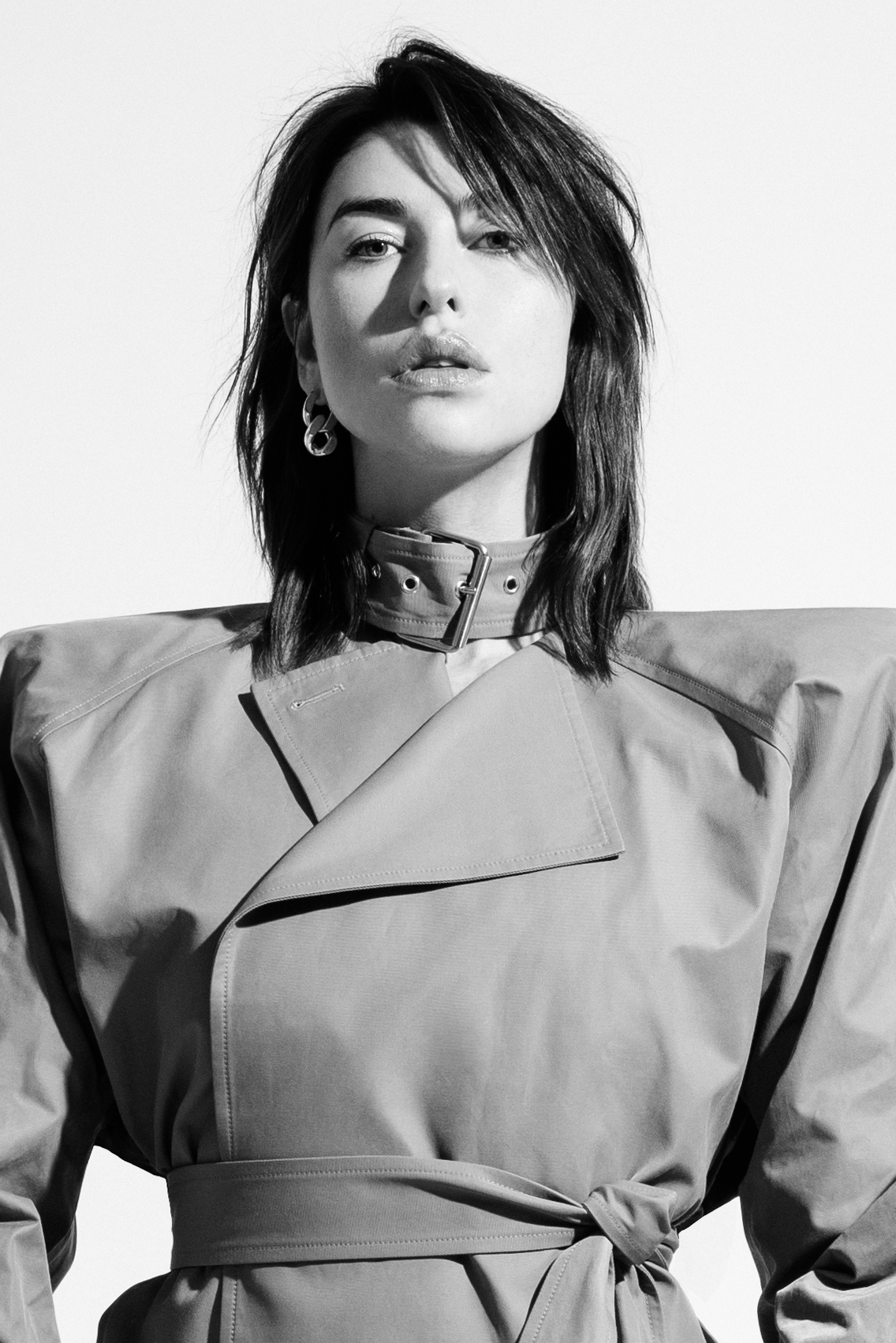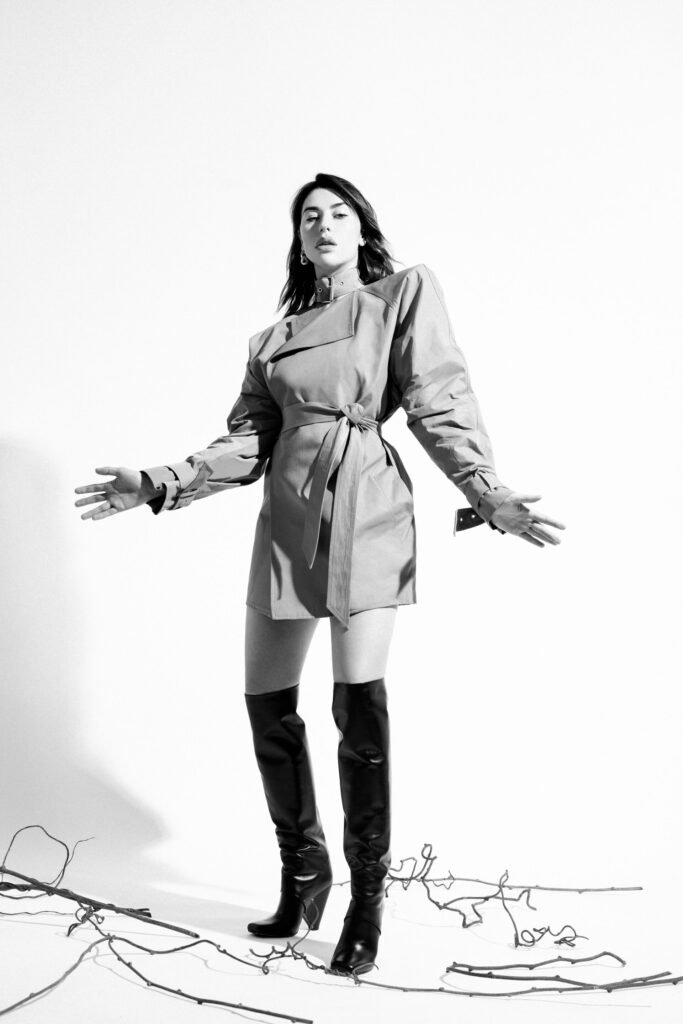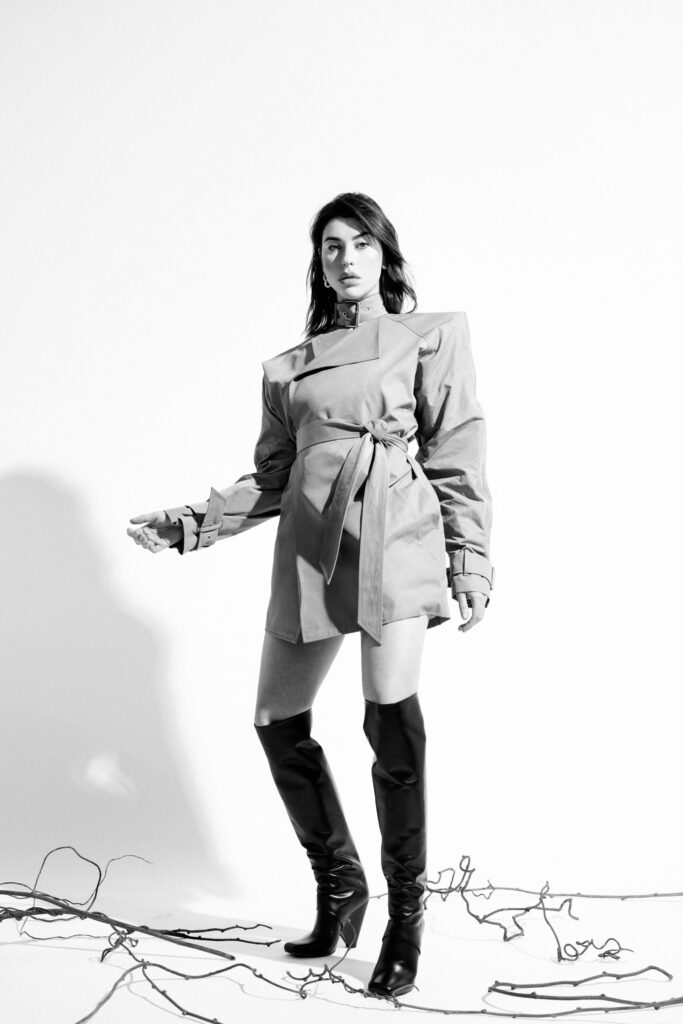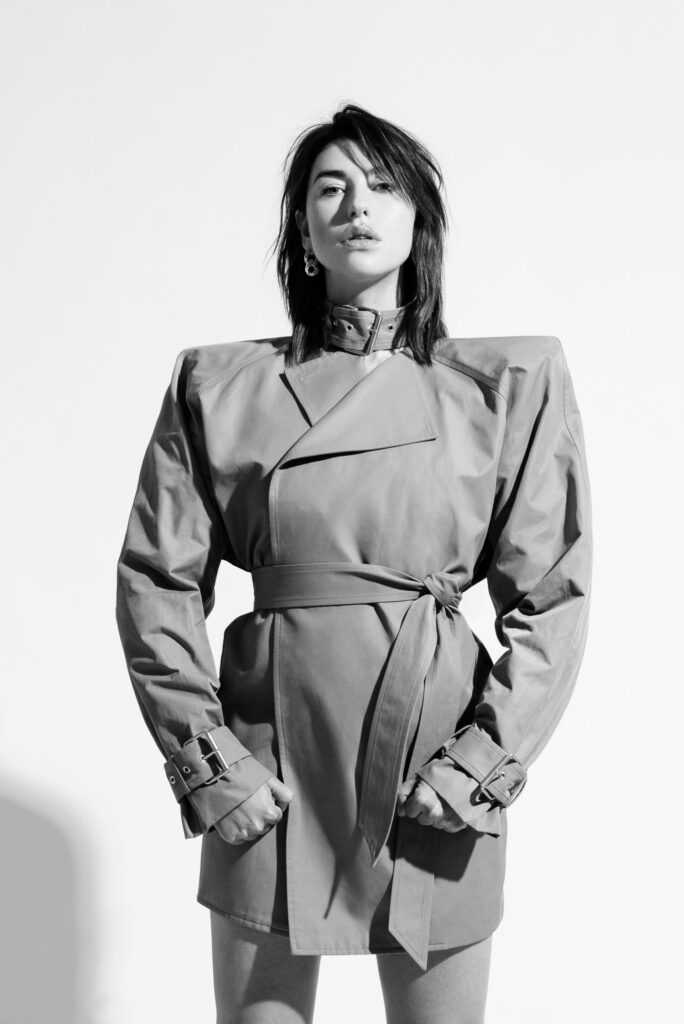Kimbra’s Reckoning: Demanding Reflection, Inspiring Connection and Crafting Sonic Transformations

Kimbra doesn’t just invite reckoning – she demands it. She goes further than punishing, she avenges. She leads the uproar, and we join her. We are like peace protestors marching in union, holding signs that read ‘hope for all’ or ‘justice brings peace’ or ‘protect what you love’. She asks for reflection and contemplation, and we offer it. We are like monks who sit in silence, turning their attention inward, quieting the mind, cultivating a state of inner stillness. The lesson is quite clear. I’ll always need my personal space, she sings. I need my time on my own. Just to be me my own best friend. For Kimbra, external chaos invites reinvention. Transformation. An opportunity to flee from the fight. Craft a symphony from a cacophony. A chance to reckon with all that is painful, misplaced, or abused. An opportunity to empower herself. A chance for her fierceness to set her free.
On the cusp of her Australian tour, the New Zealand born artist jumps on the phone with to Be to delve into her upcoming performance at the Melbourne Recital Centre, the significance of collaboration, the value of meaningful conversations and her enduring motivation to connect. Throughout the call, Kimbra’s crusading musical influence and untameable voice shine through.
Kimbra: I had to come straight from something else, so I'm just parked up in the park. Is that okay?
Rachel Weinberg: Oh, yeah, that's totally fine. Thank you for taking the time to chat with me. I know how busy life can be. So, you are coming to Australia to perform at the Melbourne Recital Centre. What do you look forward to the most when you come back ‘home’?
K: Yeah, well, obviously it's always really special. New Zealand is where I grew up, and Melbourne is also where I spent my twenties, well even younger, 17 onwards. There are so many important friendships and landmarks: old apartments I lived in; places where my music was first heard; little bars in Brunswick and Northcote where I first started gigging. I’ve got a lot of memories there. And having the opportunity to play in a really prestigious seated venue in Melbourne is really special, especially because a lot of the people who will be there have followed the work for a very long time or seen me play in some of those little pubs. Seeing friends back down in Melbourne will be good. Ah the food! I still think of Melbourne as one of the most amazing places, especially for Asian food. My band are big foodies too, so we'll all be having some great meals, I imagine.
RW: How many people are coming down from the team? Everyone?
K: It's a smaller band. I’ve been touring around the world with them. I was touring for a while without a live drummer and just triggering off drums from samples and stuff, which was fun. But I really missed the live drummer, so he's amazing. He only joined the band during COVID. And then my keyboardist who's been playing with the group for a while. So, just us three and then our sound guy and just like the crew and stuff.
RW: Have you got anything special planned for the shows in Melbourne? You've just released the album, A Reckoning, which you will be touring here for the first time.
K: Yeah! I am actually planning something special for my Australia shows. I'm keeping it quite secretive though, I want people to find out when they arrive. Let me just say it'll be an experiment in ‘presence’. I want to invite the audience to explore the concepts and ideas that I'm quite interested in. I love the idea that an audience can come and witness an artist at a very specific point of their life. The audience can authentically step into something that the artist is working on or experiencing. I wanted to channel this idea in the upcoming shows, especially as I have the opportunity to play in really regal seated theatres. I hope that everyone enters with a very open mind, ready to be challenged. I think that's what art is all about, right? It should make us think differently about certain preconceptions. And then, of course, playing new music and pulling out songs that maybe haven't been played in ages.
RW: Sounds great. Let’s talk a bit more about A Reckoning. What was the process of making the album like for you? I wanted to ask what you lent into the most when creating: was it the writing, the production, the performance? How did you conceptualise the end at the start?
K: I had one session in person with my producer at the start of the process, when we worked on ‘Save Me’, which came up really early on, but then COVID struck. We'd already, luckily set up a trajectory, though, of what we wanted the record to sound like, and so much of our process was already going back and forth, that the pandemic didn't impact us too much. I would be doing vocal sessions in upstate New York, and he would be on Zoom, giving feedback in real time, so it always felt like he was there in the room.
I set out with a pretty clear intention to make a record that had quite an intense quality and quite a vulnerable side. I'm always looking for ways that I can reveal myself and maybe in a way I haven't before. And I wanted it to be dynamic as an album. I wanted it to really play with very quiet, intimate, reflective moments and then also moments of real catharsis and rage and chaos and play with both of those spaces, which is always something I've been interested in. I just wanted it to feel like a reckoning, I guess.
As I cotinued to work on the album, I knew that was the title. Long before we started to see a lot of political and social reckonings happening in our world, I was already thinking about what the idea of ‘reckoning’ means for women who perhaps haven't been always given a context to explore some of their bigger emotions. Albums aren't always like that, sometimes they only become clear at the end, whereas with this one I knew I wanted to explore this side of myself in an album.
RW: Was it cathartic? Whilst the album was responding to the world and all its motion, were you also going through internal motions?
K: Oh, for sure, yeah. I mean, I needed to make this album to process a lot of things I was going through during the pandemic and around breakups and personal discoveries I was having about myself. A lot of the songs were written out of a place of necessity. I tried to understand and tried to process what was going on in my life, and then release that into the world. That was a catharsis too. Releasing the music opened space for new stories.
RW: I guess it would feel very vulnerable but also give you a lot of strength. I think those two ideas work very closely together.
K: Exactly. That's a big theme of the album. When we aren't afraid to embrace uncomfortable emotions and aren’t able to say things out loud, we find a deep resilience and strength and fearlessness within ourselves. We've reckoned with our emotions. We've looked them in the eye.
RW: I saw that in the ‘Replay’ music video and how much strength you were emanating. I watched it a couple of times and I thought, wow, she is really presenting herself in a new light. Where did the styling idea for the video come from?
K: The song is so much about loops and being caught on a cycle, especially the rather obsessive cycle of loss. When you lose someone, you literally cannot stop thinking about them. You become so aware of your own thoughts, you almost feel a lack of control over your mind. I wanted to depict that cycle. I wanted to depict what it was like to be in a state of possession. Almost like you're being taken over by thoughts.
In a way, there are elements of madness. And then also strength of course, because the song is also about finding agency within that cycle – being able to eventually get hold of your mind. I think sometimes we take control by protesting our bodies. So for that, I knew it needed to be quite a physical video. It needed to feel like I was facing a lot of stuff that maybe I haven't faced, you know? I kind of think of it as a confrontation. Seeing someone take back their power. So, the styling needed to portray that feeling of being both trapped and breaking out. Garments were tied together, there was corsetry and strong jackets. Everyone was really on board with it. Everything from choreography to styling, played into that idea of a woman setting herself free and taking her power back.


RW: And then in other songs like ‘Personal Space’, you write a lot about taking time for yourself and stepping back. I wanted to ask how you find respite and give yourself the time to recharge?
K: I've always been very drawn to spiritual practise and silence and nature. I really believe that we need to nurture the inner voice. For some, that's the voice of God or the universe or spirit or your true self. It’s this voice that had guided me throughout my whole life. ‘Personal Space’ is about cultivating that internal voice, not letting yourself get carried away by the external world and all of the externalised voices. For someone like me who is in the music industry or any public facing industry, it can be very tough. You always have a lot of voices telling you who you should be and what you should be. So that voice needs to be protected fiercely. Right?
Any practise that allows you to realign with the authentic voice, that small voice within, is very important to me. Trees are a big part of that too. Just sitting next to them will help me remember who I am. Also, prayer and meditation practises. That's how I re-energise.
RW: I do a lot of Bikram yoga. Have you ever done it? There's this whole idea that if you can get through the session, you can get through all the hard parts of life.
K: Yes, exactly. That's it, man. I mean, yoga is very important to me too, because if you can hold that pose for long enough, you prove to yourself that you can hold and sustain through really uncomfortable life situations. It all makes sense.
RW: Totally. That's my life. Moving back to the album, your career has been marked by collaboration and experimentation with others. What do you look for when working with other artists? Is it an alignment or an opposition?
K: Well, sometimes I will have just reached a point when I need someone else to be bring a perspective that I just don't have, whether that's a male voice, or a rhythm, or a pocket, or a perspective that I haven't got. I might have just honestly become really sick of it. A lot of the times I just don't know where to take the song anymore. And that might be the point where I send it to someone and ask what they would do on it. Collaboration sometimes just comes out of intense frustration.
RW: It's also an opportunity to learn. Even in your ‘Down the Rabbit Hole’ YouTube videos, whilst you aren’t collaborating in the traditional sense, you're still engaging in this reciprocal relationship of learning. You are having important conversations in music and dialogue. What other conversations do you wish to have or hope to have in the future?
K: Well, in my podcast, ‘Playing with Fire’ I have conversations with my favourite musicians, authors and actors, even a priest, all different people from different areas. I always ask them: What is a moment of transcendence that has shaped your life? I'm really interested in mystical experience and the transcendent, those kinds of moments that you might have in yoga or in prayer or trance states or in music. Moments when you are taken outside of yourself but also taken within yourself. Just moments that are somewhat indescribable, times when you're connected to something beyond yourself.
I think talking about the work of spirit is really important, especially in this day and age when we're pretty obsessed with material and maybe getting further and further away from that inner voice, or that thing that kind of grounds us. I want to continue having conversations where I can learn more about experiences that aren't my own. Being a musician is part of what I do, but it's only one part, you know? My gift is not just my singing, but my … what's the right word?
RW: Your agency?
K: Yeah, exactly. And just being a human being! we all offer something that isn't just our output, isn't just our work or our vocation. We offer our presence and our ability to be open. That's also a gift to the world. Right?

RW: Have you read The Power of Now by Eckhart Toll?
K: Yes! and I returned to it on tour. I went back to that book and thought, oh my God, it's so powerful.
RW: It really puts things in perspective. What motivates you to keep going? You've been in the industry for ten plus years. What keeps you coming back?
K: Not an easy question. There are definitely moments where you become pretty disillusioned.
RW: In what way?
K: Well, the business side. I never got into this for money or fame, but you need money and commerce to be a musician, to keep sustaining yourself, especially if you want to make music that is a different to the mainstream. Those parts of the industry can sadly sometimes make you forget about the initial love you had. You've got to work really hard to stay connected. Work hard to remember the ‘why’. The ‘why’ is the reason. The ‘why’ is what keeps me here. I am also very motivated by the fact that people need to feel less alone in the world. And one of the worst human experiences is believing that you're terminally unique, that no one understands your loneliness or pain. That trumps all that other shit, you know what I mean? That’s the stuff that lasts. No fucking men in suits can get in the way of that. Even money doesn't get in the way of that. I will always have the platform to reach someone. So yes it's a selfish reason because it all makes me feel so happy, but it's also a selfless reason, which is people need…
RW: Connection?
K: Exactly. Connection is what keeps me going. Exactly.
RW: When do you feel like you've connected? Through social media?
K: Well, that's my problem with social media, I actually find it quite hard to feel connected on it. So even when I do get a lot of comments and messages, it's never feels quite the same as looking at someone in the eyes during a performance, or meeting them on the street and having them say, ‘hey, this song really touched me’. That’s when you get to organically hear someone tell a story about how the work impacted them. It's not that I don't care about social media. I know it's really valuable and meaningful. Let me just say that it’s not exactly the place I find the most connection. I feel more connection in the rooms of the show: the general space of people congregating for a song or moment.
RW: Well, I'm sure you'll feel that when you come to Australia, I know you've got a huge fan base here, who are all drawn to your depth and insight. I think that's a good reason to keep going.
K: Thank you for saying that. I really appreciate it.
See Kimbra perform at Melbourne Recital Centre Friday 2 June. Tickets available here
KMRU listens with INTENT
By Anisha Khemlani
On Being Goddesses
By Ella Katz
THY FRIENDSHIP makes us FRESH
By Rachel Weinberg
Overmono
By To Be
Leon Vynehall on Holding On and Moving Forward
By Rob Feher
Arooj Aftab Moves From Delicate to Daring
By Jonah Orbach